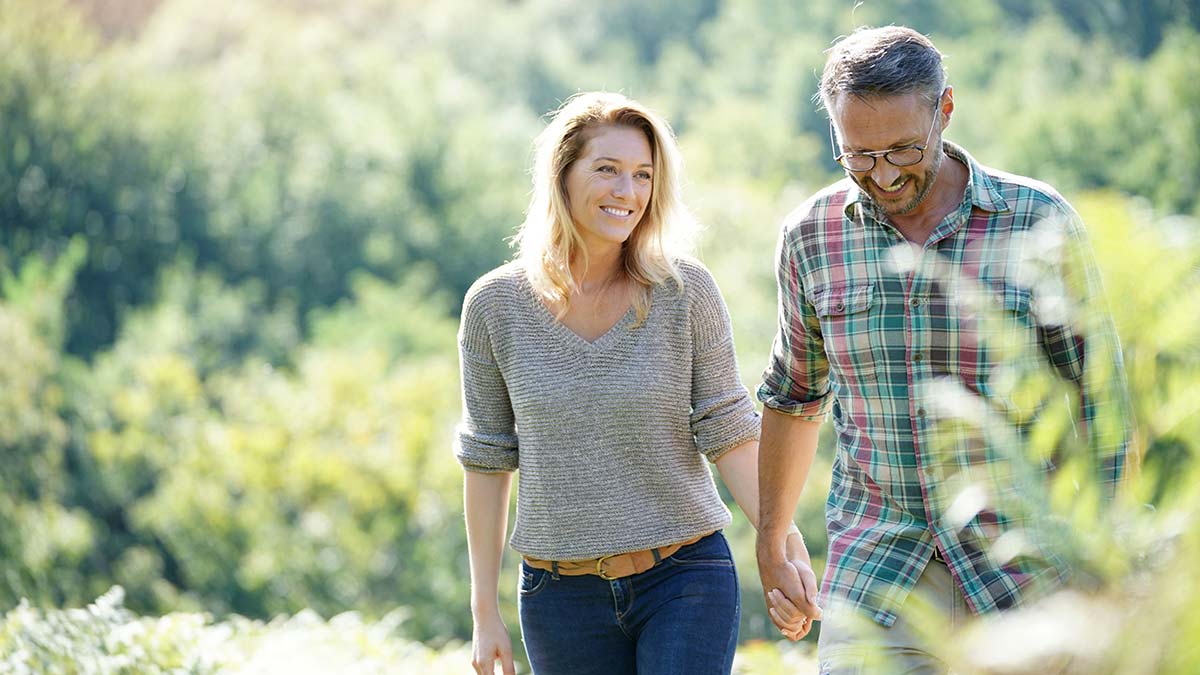A new wellbeing index from Australia’s longest-standing community for over 50s, YourLifeChoices, has revealed most older Australians are feeling positive about their safety and security, and mental, physical and financial health. This is despite significant risk factors such as employer age discrimination, pandemic-induced social exclusion, government entitlement confusion and diminished sex life.
Surveying more than 7000 Australians over the age of 50, the index is the first of its kind to provide a holistic barometer of attitudes and behaviours of the older demographic across five core wellbeing tenets.
The survey found an overwhelming majority of older Australians (70 per cent) felt younger than their chronological age, with one in five of those feeling more than 10 years younger. Strong financial wellbeing, particularly as a result of owning their home, was a catalyst for feelings of safety and security. Overall, almost three in four (73 per cent) indicated they were confident handling their finances.
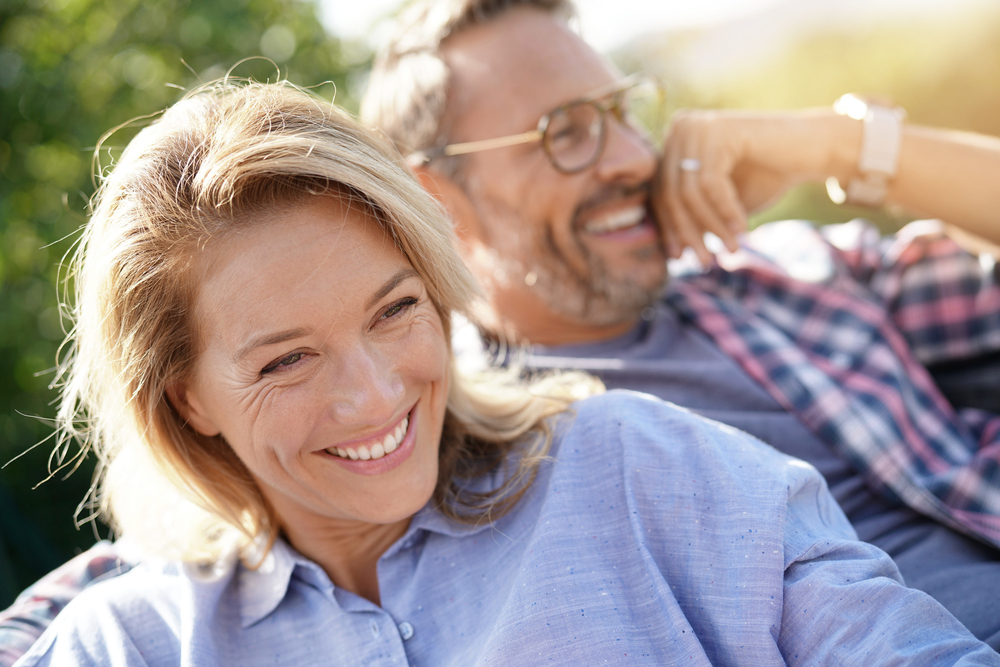
“The survey results fly in the face of common perceptions of older Australians. The data proves that older Australians are not as mentally and physically fragile as we may otherwise be led to believe. Many are feeling relatively positive about their finances too. It’s easy to forget that this demographic holds approximately 50 per cent of the country’s wealth and 46 per cent of its disposable income,” said YourLifeChoices publisher Leon Della Bosca.
“The narrative around older Australians is far too often a negative one. The thoughts and feelings of this demographic can often go missing in the public eye or simply be held to historical stereotypes. The aim of this inaugural wellbeing index was to dig a little deeper to truly understand how over 50s are really feeling.”
Despite the prevailing positivity in terms of financial comfort, respondents still cited a lack of understanding of government pensions and allowances and, alarmingly, only half (50 per cent) claimed they had a good understanding of superannuation.
However, one of the biggest risks to wellbeing was age discrimination, with 72 per cent of older Australians experiencing discrimination either in a professional or personal setting. Other risk factors considered to have a negative impact were the effects of recreational drug use (32 per cent) and alcohol consumption (15 per cent).
In terms of physical and mental wellbeing, family (53 per cent), diet (49 per cent), relationships (46 per cent) and exercise (45 per cent) ranked as having the strongest positive impact, however the data revealed that mental health in particular was an area that suffered during 2020, especially during lockdown periods. As a result, one in three respondents rated their social life as poor or very poor, and one in four respondents reported a disconnection from Australian society.
“Much like large portions of society last year, it’s not surprising that COVID-19 also took a mental toll on this demographic. Social isolation is a serious concern, so it will be interesting to see how this pattern evolves in future indexes as the vaccine rolls out across the country,” said Mr Della Bosca.
“One of the positive outcomes of the pandemic has been that we’ve seen a real return to old community values, such as looking after and talking to your neighbours, supporting local businesses, and getting involved in community organisations or volunteering groups. This will have huge impact on the lives of older Australians.”
Click here to view and download the full report.
YourLifeChoices is Australia’s longest established and most trusted digital e-newsletter and website for the 50+ audience, with a core focus on helping Australians navigate midlife and the retirement landscape. With over 270,000 members, YourLifeChoices helps older Australians stay across essential news relevant to their life stage, and offers guidance on retirement income, retirement planning, financial literacy, lifestyle, health, travel and more.
YourLifeChoices’ Older Australians Wellbeing Index 2020-21 highlights
In late 2020, the inaugural YourLifeChoices Older Australians Wellbeing Index surveyed 7294 older Australians over the age of 55.
Survey respondents
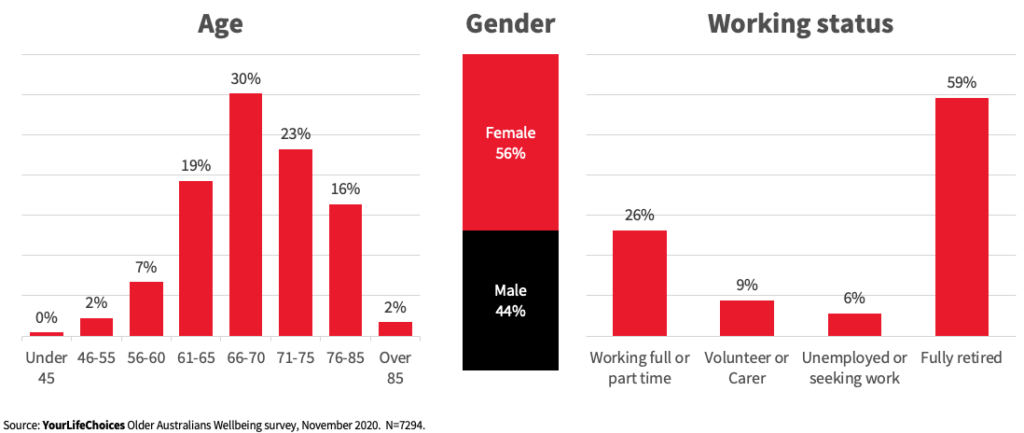
The proliferation of wellbeing studies in past decades has contributed to a growing understanding that each of the components of wellbeing are linked. Respondents to our survey told us that owning their home (financial health) significantly contributed to their feelings of safety and security. That, in turn, has positive benefits to mental health, which we know has a strong correlation to physical health.
More older Australians are feeling positive about their wellbeing than those who are feeling negative.
Older Australians Wellbeing Index: 109
Each of the components of wellbeing are in the positive territory, with physical health being the lowest and security being the highest.
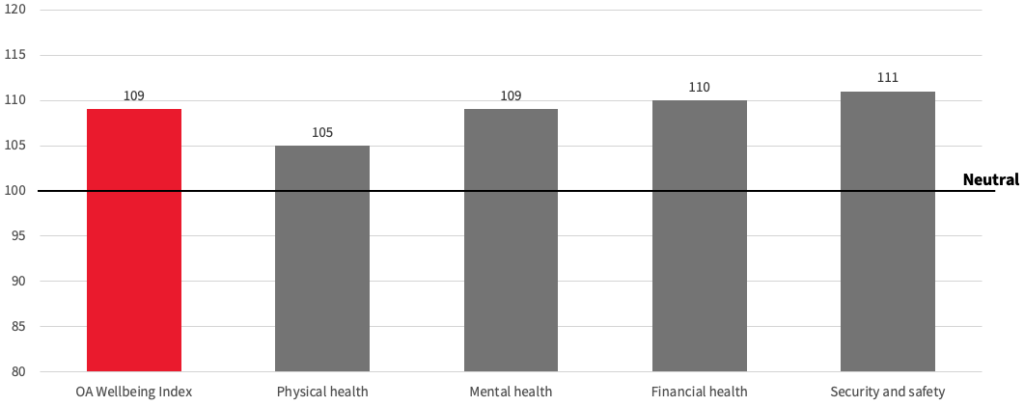
Physical health index: 105
The lowest factor within the OA Wellbeing Index, older Australians rated their physical health just above average at an index of 105. This is positively driven by excellent diet, with two in three respondents rating their diet as good or very good. In contrast, a poor sex life is having a negative impact on physical health, with almost 70 per cent of respondents rating their sex life as poor or very poor. Almost one in three respondents rated their sleep and exercise as poor or very poor, although a greater proportion (45 per cent and 40 per cent respectively) rated it good or very good.
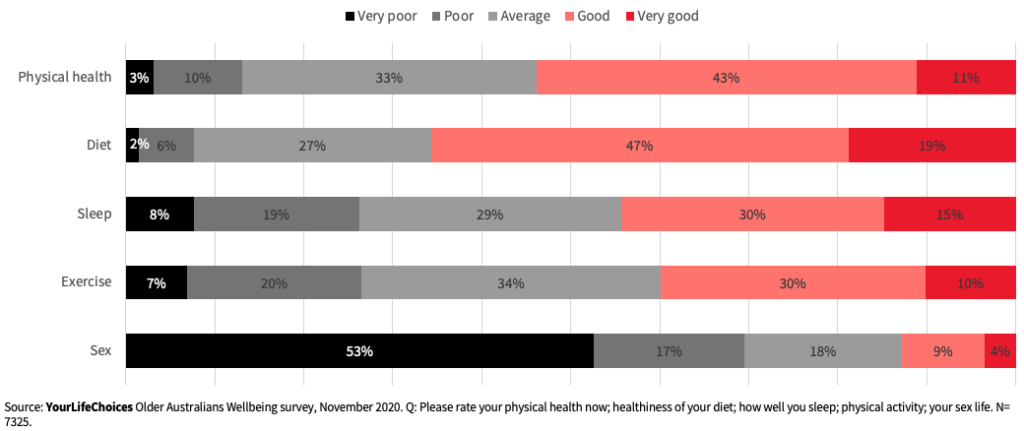
Mental health index: 109
Older Australians’ mental health rates at an index of 109, with about two in three reporting above average feelings of contentment. Despite almost one in three respondents rating their social life as poor or very poor, only 17 per cent said they felt lonely sometimes or often.
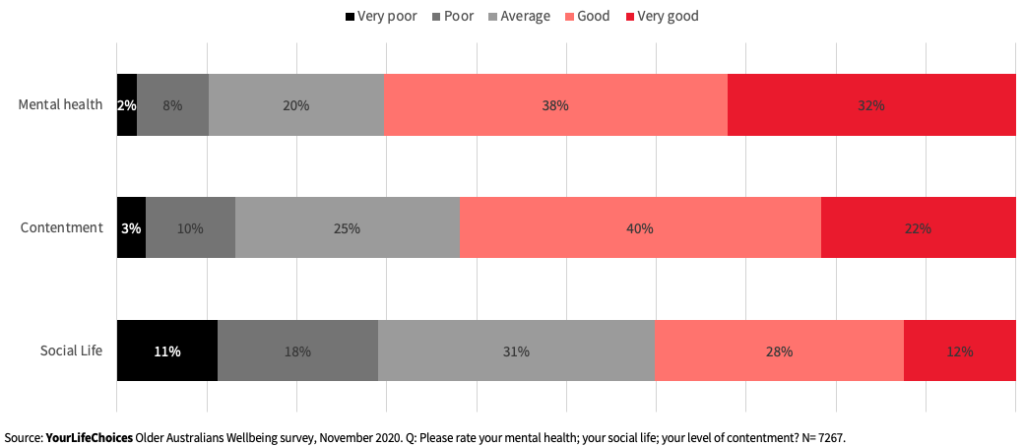
Financial health index: 110
Financial health rates highly for older Australians, with an index of 110. Almost three in four older Australians say they’re confident in handling their finances. However, around one in four have a poor understanding of government pensions and allowances, indicating they could be missing out on potential entitlements.
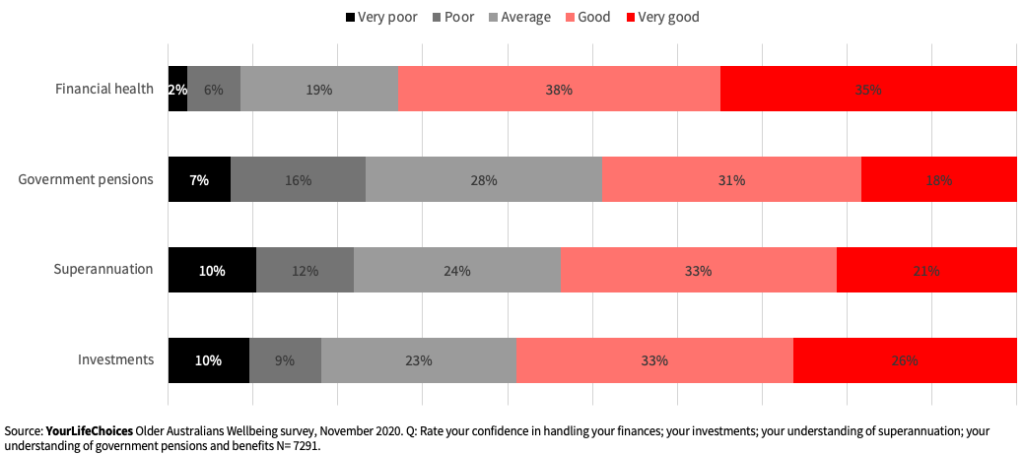
Financial future
Although the current financial health index for older Australians is largely positive, when we asked about factors affecting their future, our respondents were less enthusiastic. Less than half were confident that their finances would be sufficient to last their lifetime. Despite this uncertainty, working beyond the eligibility age for the Age Pension was an undesirable option for all but a third of our respondents. Some respondents noted that working all their lives meant that they had ‘earned the right’ to the Age Pension.
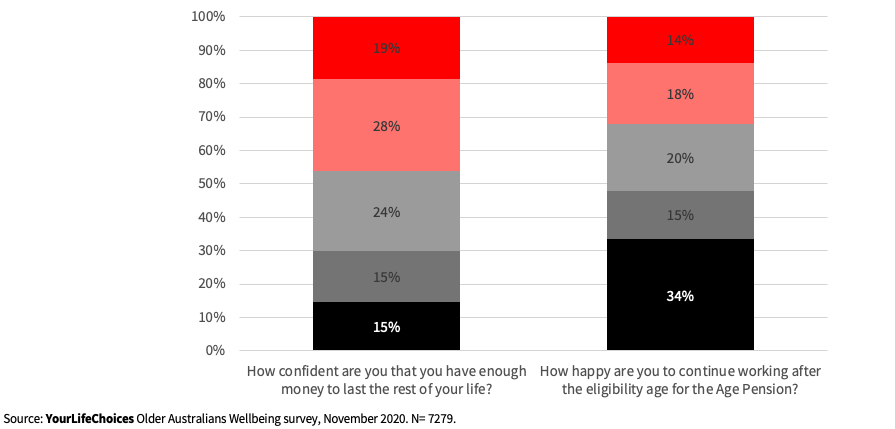
Safety and security: 111
The final component of the OA Wellbeing Index is the feeling of safety and security, which rates at an index of 111.
Older Australians feel safest in their own home, with almost nine in 10 of our respondents reporting that their sense of security at home was good, including more than half who felt their security at home was very good. However, one in four respondents reported a disconnection from Australian society, which detracted from feelings of security within their community.
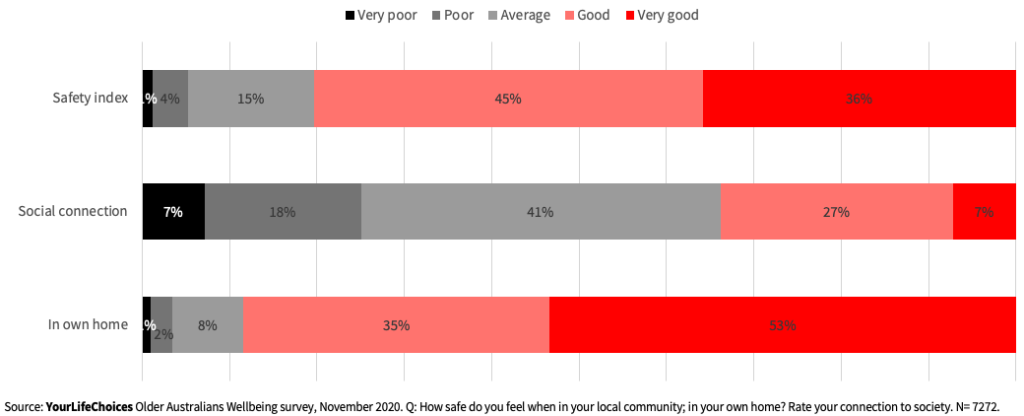
Future care concerns
Older Australians’ strong connection to the security of their homes makes at-home care services significantly more appealing than aged care facilities. COVID-19 deaths in private care facilities and the stories from the Royal Commission into Aged Care Quality and Safety means providers of those facilities have significant challenges to rebuild reputations. An increase in multi-generational homes will see continued increases in demand for support for carers, putting further funding pressure on this sector.
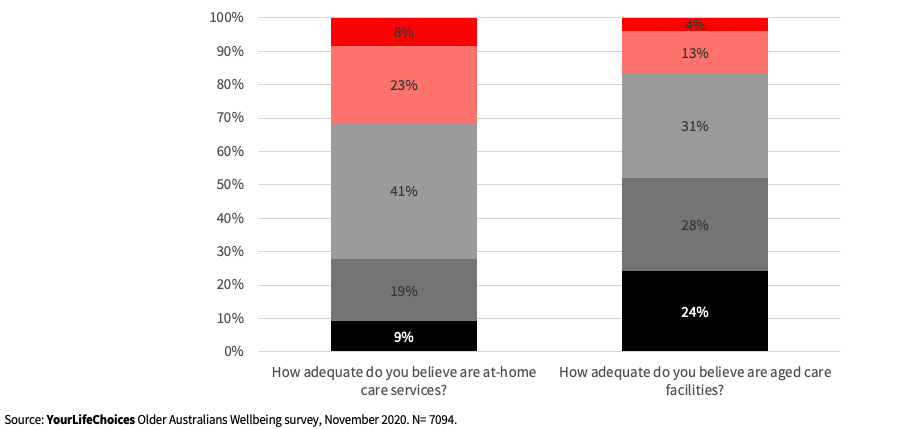
Impacts on wellbeing
As we have already seen, good diet and exercise contribute positively to the wellbeing of older Australians. Family, leisure time and hobbies and relationships each contribute to wellbeing.
“As a retiree, your main concern is health, second is financial security, then the family around you and, lastly, to have a good government that knows how to address the needs of the older society.”
YourLifeChoices member
On the other hand, the negative impacts of discrimination were felt by even more older Australians than the negative impacts of recreational drugs and alcohol. And while good financial security can have a positive impact, the lack of financial security has affected 28 per cent of older Australians.
“I find the Age Pension reasonable and can live fairly well on it. The BIG problem is when extra costs occur, such as insurances/car expenses, etc. These extras are my biggest problem.“
YourLifeChoices member
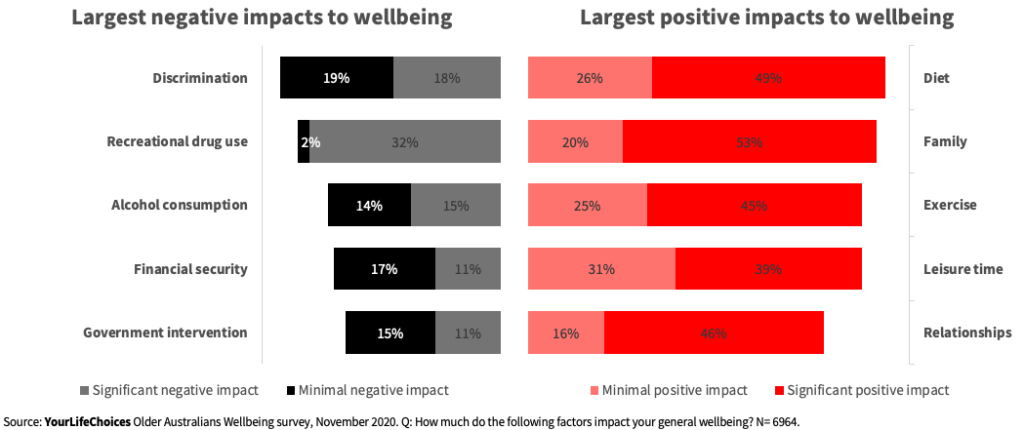
Age discrimination
For older Australians, age discrimination can contribute to feelings of alienation from society and thereby negatively affect their feelings of security and their mental health.
“People seem to have a habit of labelling everyone in a particular category (e.g. age, race) with the same brush and treating them as identically to the worst person they know in that category. It is their attitude – and not that of the person they are discriminating against – that is the problem in most cases that I have seen.“
YourLifeChoices member
More than 65 per cent of respondents said they had personally experienced age discrimination and 72 per cent had witnessed age discrimination. Key themes in the types of discrimination our respondents described were in the areas of employment, being overlooked in retail settings and in assumptions about declining physical or mental abilities.
“People seem to think because I am old that I have lost the ability to think or reason. I can still spell polytetrafluoroethylene!“
YourLifeChoices member
COVID impacts
It was not only COVID-19 infections and deaths that disproportionately affected older Australians. Declining stock market values hit superannuation balances and calls for early reopening highlighted age bias in Australian society. However, it was the feeling of safety and security that was the biggest impact for most older Australians.
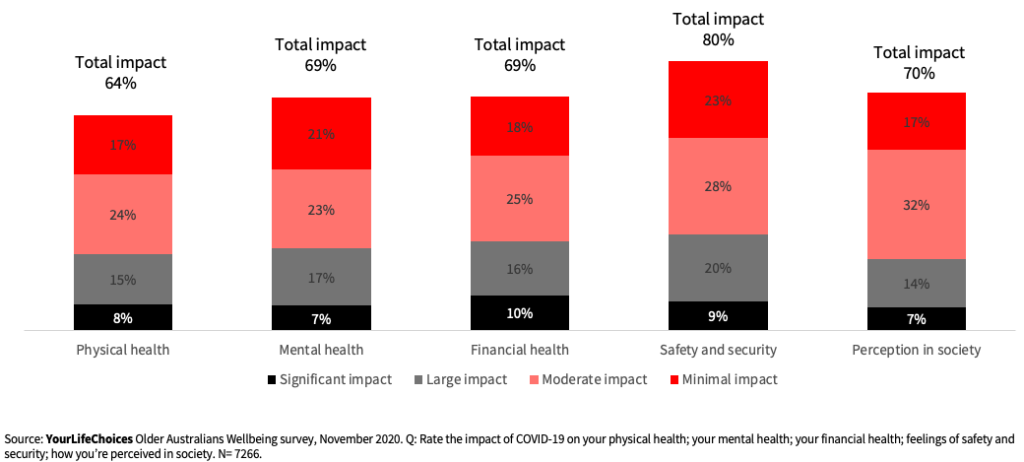
Self perceptions of age
The benefits of positive wellbeing can be improved quality of life and changes to our ‘perceived age’. So we asked our survey respondents how old they felt. The results were overwhelmingly positive. Working status had no impact on self-perception – those working full time or part time were just as likely to feel younger as retirees.
Seventy-eight per cent of respondents aged over 85 said they felt younger than their chronological age, while respondents aged under 45 were most likely to say they felt older than their chronological age (27 per cent).
However, respondents who were carers were the most likely to feel older than their chronological age, highlighting the need for improved funding to this area.
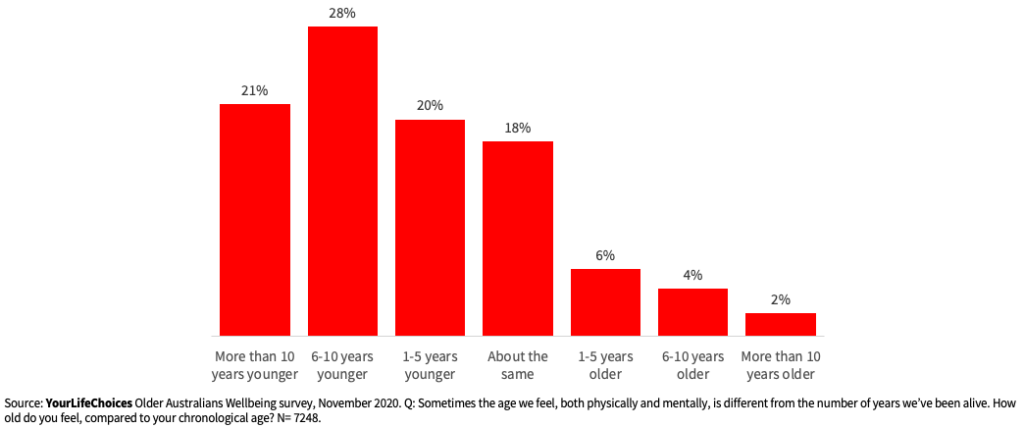
“Age is just a number. Attitude towards life keeps you either old or young. A good sense of humour is so important. I’m now in my late 70s but feel in my 30s. I love to meet with people of the same interests. I have a couple of old friends who have no interest in anything and continue to find fault with everything, be it the weather, foreigners in the country, the government, lack of money. But they never lift themselves off the couch to try and improve themselves. I have had a couple of health issues over the last few years but just accept it and battle on.“
YourLifeChoices member
Download the full report for more further detail, including what older Australians think about their governments, the state of the nation and how COVID affected their lives.


